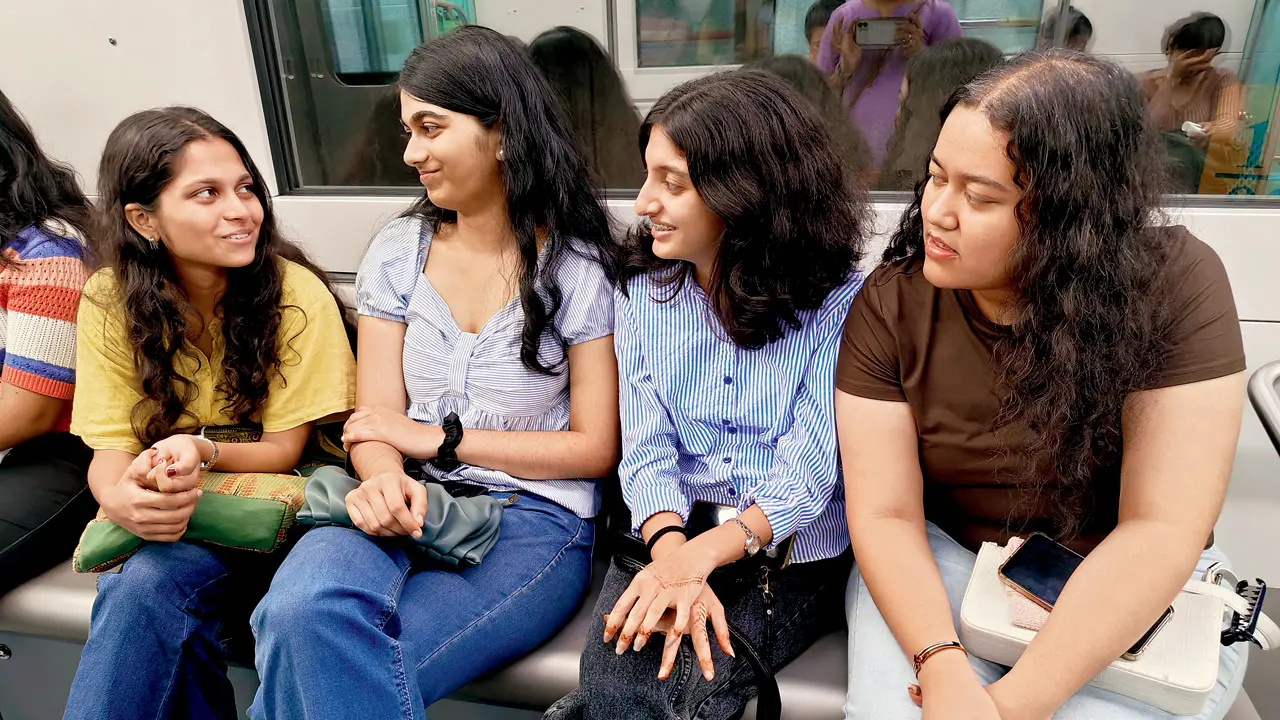While complaints about mobile network issues on the Mumbai Metro Aqua Line 3 continue to pour in, not every commuter is upset about the absence of connectivity during journeys, as some regard it as an unexpected gift — a rare pause in their otherwise hyper-connected lives. Instead of scrolling endlessly through social media or attending work calls, many are rediscovering habits long abandoned, such as reading, penning poetry, observing the world around, or simply sitting quietly with their thoughts. Some commuters have started carrying along pocket diaries, sketchbooks, or novels to make the most of their “offline” commute.
Phal N, commuter who travels daily from Santacruz to Cuffe Parade. PICS/RITIKA GONDHALEKAR
“I used to get frustrated initially,” says Phal N, a private firm employee who commutes daily via the Aqua Line from Santacruz to Cuffe Parade. “I would keep trying to get a signal to tend to work messages or check Instagram. But one day, I just stopped trying. I opened a novel instead — and now I actually look forward to this one hour of uninterrupted reading.” For many like her, an Aqua Line ride spanning 50 or 60 minutes has become a peaceful buffer between home and office.
Silver lining
The Aqua Line’s network issues have been a sore point since operations began earlier this month. However, a growing number of riders are embracing the situation, calling it a “digital detox on wheels.” “I realised I didn’t need to be available every second,” says Rohan Divecha, a chartered accountant who now uses the time to write short poems or read. “Nothing is so urgent that it can’t wait an hour. The silence has become strangely soothing.”
A group of four young friends on their way to Churchgate on Sunday said this was the first time that they hadn’t used their phones while commuting. “Earlier, even if we met and travelled together, we would end up clicking lots of photos and only discuss the captions and filters to use while uploading. But today, lack of network is actually forcing us to have conversations beyond captions and filters,” said 20-year-old Gayatri Chavan. “There’s so much to observe and talk about,” added her friend Varali Shirke, 20.
‘Blessing in disguise’
Psychologists and wellness experts agree that the absence of connectivity might actually benefit mental health. Dr Rashmi Joshi-Shetty, a consultant psychiatrist, explained, “Constant exposure to screens and social media can increase anxiety and reduce attention span. The forced disconnection that these commuters experience can serve as a natural pause, helping the brain rest and reset.”
According to her, many urban professionals rarely spend time without digital stimulation — whether it’s work, entertainment, or news updates. “Moments of boredom or silence are essential for creativity and reflection,” she added.
“The Aqua Line’s network gaps might be an inconvenience technically, but psychologically, they create a valuable window for mindfulness. Also, not only does this help with mental health but also to take of physical health. Excessive use of mobile phones leads to many eye-related issues, thumb syndrome, and also strain on the brain.”
Apart from reading and writing, several commuters say they’ve begun noticing their surroundings. “Just observing people can help us learn so many things. The other day, a group of students were discussing a political science lecture they had attended. And there was so much addition to my general knowledge about world politics,” Aditi Nigudkar, 19, one of the four friends.
Calls for balance
That said, commuters do hope for a middle ground — better connectivity for emergencies without losing the tranquillity the lack of signal has brought. Metro authorities have stated that they are working with telecom providers to strengthen signal coverage along the route.











